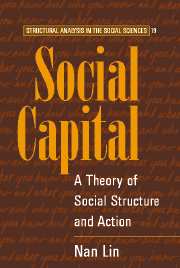Book contents
- Frontmatter
- Contents
- Preface
- Part I Theory and Research
- 1 Theories of Capital
- 2 Social Capital
- 3 Resources, Hierarchy, Networks, and Homophily
- 4 Resources, Motivations, and Interactions
- 5 The Theory and Theoretical Propositions
- 6 Social Capital and Status Attainment
- 7 Inequality in Social Capital
- Part II Conceptual Extensions
- Part III Epilogue
- References
- Index
2 - Social Capital
Capital Captured through Social Relations
Published online by Cambridge University Press: 05 June 2012
- Frontmatter
- Contents
- Preface
- Part I Theory and Research
- 1 Theories of Capital
- 2 Social Capital
- 3 Resources, Hierarchy, Networks, and Homophily
- 4 Resources, Motivations, and Interactions
- 5 The Theory and Theoretical Propositions
- 6 Social Capital and Status Attainment
- 7 Inequality in Social Capital
- Part II Conceptual Extensions
- Part III Epilogue
- References
- Index
Summary
The premise behind the notion of social capital is rather simple and straightforward: investment in social relations with expected returns in the marketplace. This general definition is consistent with various renditions by all scholars who have contributed to the discussion (Bourdieu 1980, 1983/1986; Lin 1982, 1995a; Coleman 1988, 1990; Flap 1991, 1994; Burt 1992; Putnam 1993, 1995a; Erickson 1995, 1996; Portes 1998). The market chosen for analysis may be economic, political, labor, or community. Individuals engage in interactions and networking in order to produce profits. This represents a major extension of the capital theory in general and a significant expansion of the neo-capital theory. Both neo-capital theories discussed so far – human capital and cultural capital – see capital as an investment of personal resources for the production of profit; while they differ in terms of the nature of production (skills and knowledge versus values and norms) and profit (economic return for individuals versus reproduction of the dominant culture), they both address capital as resources invested and vested in individual actors. Capital is seen as the investment or production of individual actors, whether seen as independent, atomized elements randomly located in society, as in the case of human capital theory, or as individuals indoctrinated into adopting the dominant values, as in the case of cultural capital.
But this individual perspective has been expanded with a major advance in neo-capital theory, the notion of social capital – capital captured through social relations.
- Type
- Chapter
- Information
- Social CapitalA Theory of Social Structure and Action, pp. 19 - 28Publisher: Cambridge University PressPrint publication year: 2001
- 39
- Cited by



